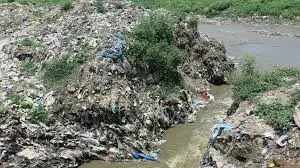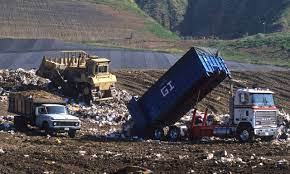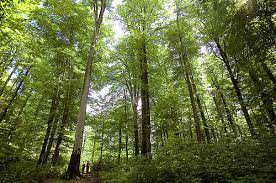Causes and Effects of Land Pollution
The effects of pollution on the land are not limited to the terrestrial ecosystem, because the synthetic chemicals are not degraded by the normal processes of life. From there, the pollution can travel through the roots of plants into any herbivore which consumes the plant and on and on and on until it reaches the highest organisms in the food web: humans.
Causes of Land Pollution
The following are the major causes of land pollution:
Increase in urbanization: Construction uses up forestland. More constructions means increase in demand for raw materials like timber. This leads to the exploitation and destruction of forests. There is more demand for water. Reservoirs are built leading to the loss of land.
Increase in agricultural land: As the human population grew there was a greater demand for food. This caused more land to be allocated to agriculture. Forests were cut down for this purpose.
Domestic waste: Every single day, tons and tons of domestic waste are dumped ranging from huge pieces of rubbish such as unused refrigerator to fish bones. If all these wastes are not disposed of properly, the damage they can do to the environment and humankind can be devastating.
While waste collected from homes, offices and industries may be recycled or burnt in incinerators, a large amount of rubbish is neither burnt nor recycled but is left in certain areas marked as dumping grounds.
Read Also : Land Pollution and Composition of Land Pollution
We throw away more things today and this causes an increase in the quantity of solid waste. This has given rise to new dumping grounds being sought after.
Agricultural activities: Besides domestic waste, pesticides and herbicides used by farmers to increase crop yields also pollute the land when they are washed into the soil.
Industrial activities: These are also are a contributing factor to land pollution. For example, in open cast mining, huge holes are dug in the ground and these form dangerously deep mining pools.
Heaps of mining waste are left behind and these waste often contain several poisonous substances that will contaminate the soil.
Pollution sources include plastic factories, chemical plants, oil refineries, nuclear waste disposal activity, large animal farms, coal-fired power plants, metals production factories and other heavy industries.
Effects of Land Pollution
There are a number of adverse effects of land pollution, such as:
Exterminates wild life
Acid rain that kills trees and other plants.
Vegetation that provides food and shelter is destroyed.
It can seriously disrupt the balance of nature, and, in extreme cases, can cause human fatalities.
Pesticides can damage crops; kill vegetation; and poison birds, animals, and fishes. Most pesticides kill or damage life forms other than those intended.

For example, pesticides used in an effort to control or destroy undesirable vegetation and insects often destroy birds and small animals. Some life forms develop immunity to pesticides used to destroy them.
Causes problems in the respiratory system
Causes problems on the skin
Leads to birth defects
Causes various kinds of cancers
The toxic materials that pollute the soil can get into the human body directly by:
Coming into contact with the skin
Being washed into water sources like reservoirs and rivers
Eating fruits and vegetables that have been grown in polluted soil
Breathing in polluted dust or particles
How can Land Pollution be prevented?
People should be educated and made aware about the harmful effects of littering.
Items used for domestic purposes ought to be reused or recycled.
Personal litter should be disposed properly.
Organic waste matter should be disposed in areas that are far away from residential places.
Inorganic matter such as paper, plastic, glass and metals should be reclaimed and then recycled.
Encourage organic farming.
Reduce use of herbicides and pesticides.
Read Also : Recycling as a Method of Environmental Pollution Control
In summary, the nature of the industrial revolution and the lack of a sustainable development model for industrial progress have allowed the creation of chemicals and products which may serve the idea of convenience or productivity or efficiency, however, the concept of environmental stewardship is largely an afterthought.
This has led to long-lasting chemicals which persist in the environment and are potentially toxic to life.
The effects of pollution on the land are not limited to the terrestrial ecosystem, because the synthetic chemicals are not degraded by the normal processes of life.
Pesticides and herbicides used by farmers to increase crop yields also pollute the land when they are washed into the soil.
People should be educated and made aware about the harmful effects of all forms of pollution.



